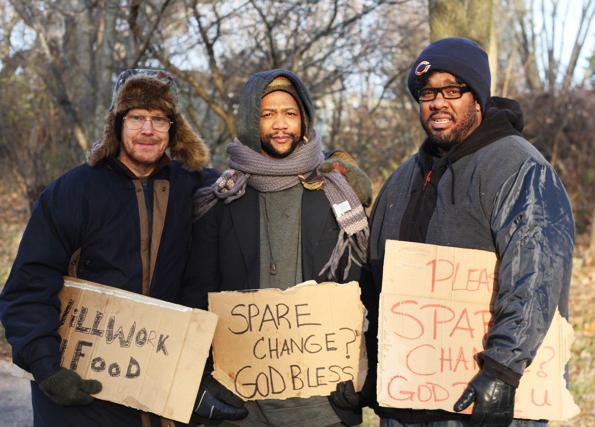Despite minor percentile improvements, many Wisconsinites experience economic hardship and live in poverty, according to a report released by the Coalition on Human Needs and 9 to 5 Wisconsin.
The report, or the “Wisconsin Poverty Snapshot,” measured poverty across the state. According to the report, 11.3 percent of Wisconsinites lived in poverty in 2017, down .5 percent from 2016.
But the report also stated that those numbers are “statistically unchanged,” or that the percentile improvement is too minor to be significant or statistically meaningful.
The report additionally stated that about 638,000 people live in poverty in Wisconsin, and 1.5 million people live near poverty.
In terms of the U.S., Wisconsin is ranked 33rd in terms of poverty. Deborah Weinstein, the executive director of the Coalition on Human Needs, described this ranking.
“Wisconsin’s poverty rate is lower than the national average,” Weinstein said. “For 2017 … the U.S. poverty rate was 13.4 percent — Wisconsin’s rate was 11.3 percent, so better than the U.S. total. With lower poverty than the national average, you’d expect Wisconsin to show up ranked with less poverty than many other states.”
UW joins Shepherd Higher Education Consortium of Poverty, supporting internships in poverty studies
A multitude of factors to contribute to poverty, including low education and opportunity, single-parent family structure, low-wage and part-time employment, barriers to employment, or a history of incarceration, Rebecca Schwei, a researcher at the Institute for Research on Poverty at UW, said.
The Coalition on Human Needs website links national organizations together to promote the rights and needs to vulnerable and low-income populations. They work with organizations that support civil and religious rights, along with those that support the elderly, women, children and the disabled.
Weinstein added that the unemployment rates in the state of Wisconsin are lower than the national average. According to the Department of Labor Statistics, the annual average unemployment rate in the U.S. was 4.4 percent in 2017. Wisconsin, with a 3.3 percent unemployment rate, was ranked 10th out of all states.
Weinstein, however, cited a troubling trend in labor statistics.
“A key and troubling factor is race: across the nation and even more so in Wisconsin, people of color and Hispanics of any race are more likely to be poor,” Weinstein said.
Weinstein added that Wisconsin has a higher white population than the national average and that the white population has a lower rate of poverty than the rest of the U.S. But the opposite is true for people of color.
According to a report by the Henry J. Kaiser Family Foundation, the poverty rate for white people is 8 percent nationally. In the state of Wisconsin, that rate is 6 percent.
The report also found that nationally, black people had a poverty rate of 20 percent. In Wisconsin, that rate is 27 percent.
As Wisconsin overhauls welfare programs, UW offers new anti-poverty solutions
According to the Snapshot, federal and state government programs worked to lift people out of poverty. The report statesd that Social Security lifted 27 million individuals out of poverty nationally in 2017. Additionally, Supplemental Security Income lifted 3.2 million people out of poverty, as did the School Lunch Program for 1.2 million people.
In terms of helping those who are low-income, the report stated that 2.9 million fewer people were poor because of housing subsidies and 3.4 million fewer people were poor because of programs like food stamps and others designed as food assistance.
People in poverty face a variety of issues, Weinstein noted — some of which have deeply worrisome effects.
“People in poverty are more likely to suffer ill-health, to be unemployed or in unstable employment, to move frequently,” Weinstein said. “Children who experience time in poverty are more likely to suffer ill health, chronic health conditions, developmental delays, fall behind in school, drop out of school, and earn less during their adult years.”
According to the Snapshot, in Wisconsin, 26 percent of those who are working-age with incomes between half the poverty line and just below the poverty line had employer-based insurance. 53.9 percent had Medicaid coverage.
The report also noted that, in Wisconsin, 58 percent of households earning less than $20,000 paid more than half of their income on rent in 2017. Ten percent of Wisconsin households, between 2015 and 2017, experienced times when they could not afford food.
Weinstein also said those beyond the poverty line face economic issues as well.
“Many people well above the poverty line find it increasingly difficult to save, to buy homes, to get an education above high school (or help their children get one), or to be secure in retirement,” Weinstein said.
She added that, despite what some may believe, many people who are poor have employment. She added that while some may not work year-round or full time, a lot of work can be unstable, low-paid, and offering minimal to no sick leave.
The Snapshot noted that President Donald Trump’s administration’s ongoing battle with states regarding Medicare and Medicaid could result in rollbacks to healthcare that greatly harm poverty-stricken populations. Similar measures to cut funding for food assistance could have harmful effects as well, the report adds.
“Efforts to deny health care or food assistance will throw more people in poverty because they get sicker and can’t get treatment,” Weinstein said.


















